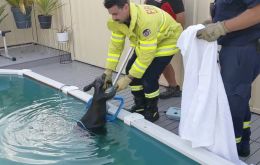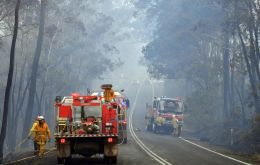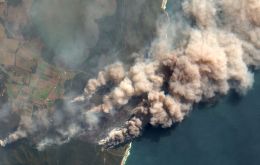MercoPress. South Atlantic News Agency
Environment
-
Thursday, December 26th 2019 - 12:15 UTC
Chile: Allegedly intentional fire in Valparaíso consumed around 245 houses at Christmas

A voracious fire in the Chilean city of Valparaíso began on Tuesday and extended until after Christmas Eve on Wednesday, leaving about 245 homes destroyed, 2000 people without power and a dozen injured. The authorities believe that the fires in the tourist city were intentional.
-
Thursday, December 26th 2019 - 12:00 UTC
Strong earthquakes strike Colombia, with no reports of injuries or major damage

Two strong earthquakes, of magnitude 6.2 and magnitude 5.7, struck central Colombia on Tuesday, the Colombian Geological Service said, but there were no immediate reports of any injuries or major damage.
-
Tuesday, December 24th 2019 - 09:10 UTC
Only in bush fire ravaged Australia, a kangaroo spotted cooling off in a pool

A kangaroo has been spotted cooling off in a backyard pool in a bush fire-ravaged region of Australia while elsewhere firefighters have been rescuing koalas from trees threatened by flames.
-
Saturday, December 21st 2019 - 11:03 UTC
Australia: “catastrophic” conditions in Greater Sydney surrounded by a ring of fire

Firefighters in the Australian state of New South Wales were bracing for “catastrophic” fire conditions on Saturday as temperatures well above 40 degrees Celsius and strong winds were set to fuel more than 100 fires burning across the state.
-
Friday, December 20th 2019 - 09:49 UTC
Brazil mining regulator dismisses a Vale dam is in danger of collapse: “structurally sound”

A dam owned by iron ore company Vale SA that was the subject of an investigative report by a TV program last week is structurally sound and there is no reason for concern, Brazil’s national mining regulator said this week.
-
Thursday, December 19th 2019 - 09:19 UTC
Australia's inferno as heat wave worsens with temperatures of 46C

While Prime Minister Scott Morrison is overseas on vacation, Australia this week experienced its hottest day on record and the heat-wave is expected to worsen, exacerbating an already unprecedented bushfire season, authorities said on Wednesday.
-
Thursday, December 19th 2019 - 08:41 UTC
Seven-day state of emergency in Australia's New South Wales state ravaged by bushfires

Australian authorities declared a seven-day state of emergency in New South Wales state on Thursday as a record heatwave fanned unprecedented bushfires raging across the region.
-
Tuesday, December 17th 2019 - 09:59 UTC
Brazilian government dismisses as a “commercial game” results of COP25 climate talks in Madrid

Brazilian President Jair Bolsonaro, a climate change skeptic, dismissed as a “commercial game” the result of the COP25 climate talks in Madrid. He particularly singled out rich European nations as the players.
-
Monday, December 16th 2019 - 13:59 UTC
Brazilian president under fire due to the Amazon situation

Brazil’s Amazonian reserve has always been a cause for contention between indigenous activists and the Brazillian government. Covering the majority of northwestern Brazil and extending into Columbia, Peru and a whole host of South American nations, the Amazon is the world’s largest rainforest famed for its biodiversity and natural beauty.
-
Monday, December 16th 2019 - 09:13 UTC
Minute of silence in New Zealand for volcano victims; Royal Caribbean potential criminal liability

New Zealanders across the country observed a minute of silence on Monday to honour the victims of last week's fatal volcanic eruption. The official death toll from the surprise eruption on White Island, also known by its Maori name of Whakaari, stands at 16. Two people whose bodies are believed to be in the waters around the island are still officially listed as missing.
